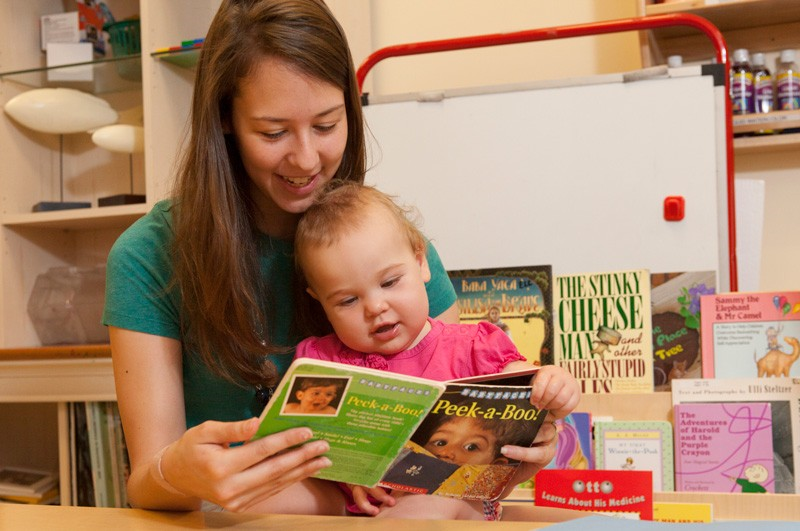School of Education
Reading to Children

‘Smart’ technology is no substitute for a living, breathing adult, says UD researcher
In the eyes of a child who is learning how to read, touchscreen tablets and “smart” technology are no substitute for a living, breathing adult. At least, that’s according to new research by University of Delaware doctoral student Daniela Avelar.
The cognitive benefits a child experiences when reading with an adult are well known, but Avelar’s research indicates that there are emotional and physiological benefits as well.
When reading with a child, the adult assumes the roles of storyteller and teacher, both guiding the child through a narrative while also answering questions when the child becomes inquisitive or confused. A tablet may be “smart” enough to mimic some of the actions of the adult, but it is not necessarily an adequate replacement.
Avelar, who is pursuing a doctoral degree in education with a specialization in learning sciences, tracked the emotional responses of 40 four-year-old children during three reading scenarios: co-reading a physical book with their mothers, co-reading an e-book with their mothers, and listening to an e-book independently.
To understand the emotional response to reading, Avelar monitored the physiological reactions of both parents and children using E4 multi-sensor bracelets, which are made by Empatica, Inc. The bracelets are like fancy Fitbits that measure heart rate and skin conductivity. When a person is exposed to stimuli, such as reading, sweat secretion allows the skin to momentarily conduct electricity more efficiently, which is known as skin conductance responses (SCRs). Avelar is then able to translate that data to measure each child’s state of alertness. The more SCRs, the more attentive the child. Additionally, Avelar monitored facial expressions to track emotions (happy, sad, interested, angry, worried, and neutral) and asked children to rate how they feel before and after reading the book.
In recognition of Children’s Book Week, Avelar shared information about her research in a question-and-answer interview.
Q: What prompted you to pursue this research project?
Avelar: The cognitive benefits of parent-child shared book reading have been well established, but few studies have examined the emotional benefits of such interactions. Parents sometimes do not have time to read with their children, but with the availability of eBooks, parents can give a book to their children and have them listen to it, while they attend to other tasks. But, are they missing out on an opportunity to bond with their child? Are there emotional benefits of co-reading with a child?
Q: How did you test for this?
Avelar: We explored 4-year-old children’s reading experiences when they co-read a traditional book or an e-book with their mothers or when they listened to an e-book independently by measuring physiological arousal, facial affect expressions, and self-reported emotion. Reading a traditional book with a parent was associated with greater physiological reaction measured by E4 multi-sensor bracelets. Children’s facial expressions were also more positive in terms of happiness and interest when reading with a parent compared to listening to an e-book independently. These findings suggest that that reading e-books independently may cause children to miss out on valuable emotional experiences that come from shared book reading.
Q: Why is this of interest to you?
Avelar: Tablets are becoming really popular and it is crucial to understand the impact they are having on parent-child interactions and on children’s development. While there are many advantages of using tablets for reading, like using the auto-narration option and making books available for children when their parents are busy, there may be potential downfalls that should be investigated.
Q: What are the potential implications?
Avelar: This research project is important because it will highlight why sharing books is important not only for children’s cognitive, language and literacy development but also to strengthen the bond between children and parents. We’ve also studied the physiological impact reading to a child had on the parent, and determined this shared experience may also reduce stress and put the reader in a better mood.
Q: What has your work shown so far?
Avelar: So far, we have examined emotions using physiological data, facial emotion coding, and self-report and initial results suggest that reading with a parent is a different emotional experience than reading an e-book independently. We are looking to expand our research and are recruiting families with 4-year-old monolingual or Spanish-English bilingual children to participate. The session lasts approximately 60 minutes and takes place in UD’s Child Play Lab in Willard Hall Education Building.
For more information on participating in this study, please visit the project website or email childsplaylab@gmail.com or call (302) 831-2073.
Article by Jordan Howell.
Photo by Evan Krape.



